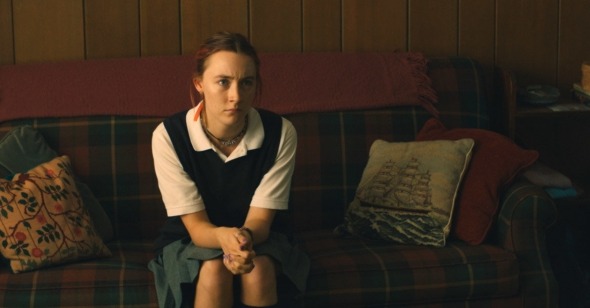Taking Flight
By Caroline Madden
Lady Bird
Dir. Greta Gerwig, U.S. A24
Greta Gerwig is no stranger to working behind the camera, having co-directed Nights and Weekends with Joe Swanberg and co-written several films, most notably Frances Ha and Mistress America with director and partner Noah Baumbach. With her latest, the semi-autobiographical Lady Bird, Gerwig emerges as a filmmaker with her own distinct voice. While her take on the coming-of-age film might hit familiar notes—prom night, idolizing the “popular girls,” losing one’s virginity, passing from high school to college—her authentic characterizations and poignant yet sharp-witted dialogue help the film transcend such well-worn tropes.
Taking place in Gerwig’s hometown of Sacramento in 2002, Lady Bird follows rebellious Catholic schoolgirl Christine (Saoirse Ronan) during her last year of high school. There is no ham-fisted nostalgia here, despite a few off-hand references to 9/11, the Iraq War, and dial-up Internet. Gerwig evokes that specifically senior-year feeling of adulthood’s rapid approach through a swift editing style, offering a dynamic rhythm that conjures the sense of finite time she has with family and friends, a patchwork of energetic montages propelling Christine, and the story, forward. She also navigates misguided relationships with the drama club’s leading man (Lucas Hedges) and a brooding bandleader and faux radical played by Call Me by Your Name’s rising star Timothée Chalamet.
Christine re-christens herself “Lady Bird,” a sobriquet emblematic of her desire to fly far from her pedestrian hometown, which she calls the “Midwest of California.” She dreams of residing in New York City, a world away from kitschy Western-style discount stores of “Thrift Town.” Gerwig depicts the homogeneity and tedium of her myopic educational environment with a satirical geniality; schoolgirls receive citations for short skirts and stand in pews vacuously reciting prayers, and at one point Lady Bird ties a “Married to Jesus” sign to a nun’s car. Her school is not a dogmatic and formidable institution as seen in so many films about Catholic education, such as 1985’s Heaven Help Us, for Gerwig takes pains to show that its kindly nuns strive to help Lady Bird rise above her lack of scholastic achievements.
At its core, Lady Bird is a mother-daughter love story. Lady Bird and Marion (Laurie Metcalf) share a tempestuous relationship; their exchanges will often mutate from tears to laughter to indignation within the span of a few minutes. The film’s first scene illustrates the capricious nature of their interactions: Lady Bird and Marion are weeping to The Grapes of Wrath audio book before Lady Bird waxes poetic about living in “Connecticut or New Hampshire where writers live in the woods.” Marion bluntly calls her “a snob” before their arguing ascends into a cacophony. Fed up with her mother’s sarcastic premonition that she’s destined for jail or City College, Lady Bird jumps out of the moving car, eliciting a horrified scream from Marion. It is a testament to the strength of Metcalf’s nuanced performance that whenever she delivers a disparaging line to Lady Bird we understand it comes from a place of love. Marion’s off-hand comment about growing up with an alcoholic mother accounts for her inability to express herself to her daughter and the tensions that result from their miscommunication; since she never experienced an amicable maternal relationship, she finds it difficult to foster one herself. Against Metcalf’s weary intensity, Saoirse Ronan imbues Lady Bird with a dogged sincerity as she pursues her lofty aspirations, and superbly delivers Gerwig’s almost constant flow of deadpans. As in Brooklyn, Ronan fully inhabits the bewildering chasm between girl and womanhood.
Gerwig and Ronan’s profound understanding of the female adolescent experience—including how insecure teenage girls look toward others to shape their identity—particularly resonates through Lady Bird’s interactions with her best friend, Julie, played as sweet and wide-eyed by Beanie Feldstein. Julie envies Lady Bird’s free spirit and mimics her use of a nickname, and is hurt when she infiltrates the upper echelon of her school’s social ecosystem by befriending its queen bee, Jenna (Odeya Rush). Gerwig also swiftly tackles feminine beauty standards and body image: in a scene that avoids didactic after-school special sentiment thanks to Gerwig’s unforced observational style and sarcastic jabs, Julie and Lady Bird express their wish to look like a magazine’s couture model, photographed standing before an elegant New York City high-rise with her gazelle-like legs and svelte body.
Many of Lady Bird’s teenage insecurities stem from the vast class divide she faces at her affluent private school. Despite her father’s instance that “money is not life’s report card,” Lady Bird covets the material markers of success her upper-class peers possess—their stately mansions and sparkling four-wheel drives. Lady Bird resents her middle-class mundanity, made worse when her docile father Larry (Tracy Letts) gets fired from his job and competes for the same positions as his 20-year-old adopted son Miguel (Jordan Rodrigues). This unfortunate incident not only heightens their financial woes and exacerbates familial tensions but also mobilizes Lady Bird’s desire to abandon her Sacramento home, which lies literally, as she says, “on the wrong side of the tracks.” It takes the fruition of Lady Bird’s dreams for her to truly appreciate—and miss—her hometown and for the fractured mother and daughter relationship to mend.
The warmth and sincerity of Greta Gerwig’s Lady Bird eclipses the caustic edge of recent female-centric coming-of-age films such as The Diary of a Teenage Girl and The Edge of Seventeen. There’s an eccentric individualism to Gerwig’s nimble approach to form and flow of dialogue. Gerwig also boldly rejects the idea that stories about teenage girls have to focus on romance. Instead, Lady Bird’s arc centers on the quest for a sense of self, which speaks to the importance of having female directors tackle stories from their own points of view.
